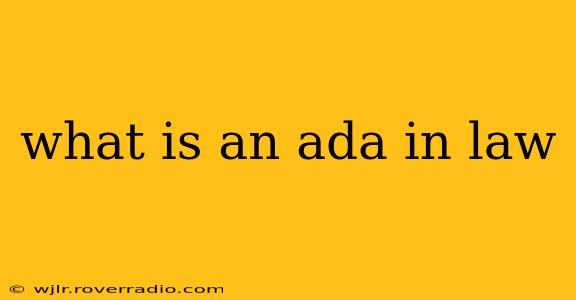The Americans with Disabilities Act (ADA) is a landmark piece of American legislation that prohibits discrimination based on disability. Enacted in 1990, it guarantees equal opportunities for individuals with disabilities in various aspects of life, including employment, state and local government services, public accommodations, commercial facilities, and transportation. Understanding the ADA's complexities requires delving into its core tenets and addressing common questions.
What does ADA stand for?
ADA stands for the Americans with Disabilities Act. It's a crucial piece of civil rights legislation that ensures people with disabilities have the same opportunities as everyone else.
What are the key provisions of the ADA?
The ADA's key provisions fall under five titles, each addressing a different area:
-
Title I: Employment: This prohibits discrimination against qualified individuals with disabilities in job application procedures, hiring, advancement, compensation, job training, and other terms, conditions, and privileges of employment. Employers must provide reasonable accommodations to enable qualified individuals to perform essential job functions, unless doing so would impose an undue hardship.
-
Title II: State and Local Government: This guarantees equal opportunity to individuals with disabilities in all programs, services, and activities of state and local governments. This includes access to public transportation, courts, and other government functions.
-
Title III: Public Accommodations: This requires private entities that own, lease, or operate places of public accommodation—such as restaurants, hotels, theaters, and stores—to remove architectural, communication, and other barriers that limit access for individuals with disabilities.
-
Title IV: Telecommunications: This mandates that telephone companies provide relay services to allow individuals with hearing or speech impairments to communicate via telephone.
-
Title V: Miscellaneous Provisions: This section covers a range of provisions, including the establishment of the Architectural and Transportation Barriers Compliance Board and protection against retaliation for ADA-related activity.
What constitutes a disability under the ADA?
The ADA defines a disability as:
- A physical or mental impairment that substantially limits one or more major life activities;
- A record of such an impairment; or
- Being regarded as having such an impairment.
This definition is broad and includes a wide range of conditions, from visible physical disabilities to less visible conditions such as mental health disorders, learning disabilities, and chronic illnesses.
What are reasonable accommodations under the ADA?
Reasonable accommodations are modifications or adjustments to a job, the work environment, or the way things are usually done that enable a person with a disability to apply for a job, perform essential job functions, or enjoy equal access to benefits and privileges of employment. Examples include:
- Modified work schedules: Flexible hours or telecommuting options.
- Adaptive equipment: Specialized tools or assistive technologies.
- Job restructuring: Reassigning non-essential functions.
- Modified or alternative training materials: Providing information in accessible formats.
The determination of what constitutes a reasonable accommodation is based on the specific circumstances and needs of the individual and whether the accommodation would impose an undue hardship on the employer.
What are the penalties for violating the ADA?
Violations of the ADA can result in significant penalties, including:
- Injunctive relief: Court orders requiring the violator to cease discriminatory practices and take corrective actions.
- Monetary damages: Compensation for the individual's losses, including back pay, compensatory damages, and punitive damages.
- Civil penalties: Fines imposed by the court.
The ADA is a complex law with far-reaching implications. This overview provides a basic understanding; it's crucial to consult legal professionals for specific advice on ADA compliance or for situations involving alleged violations. Navigating the intricacies of the ADA often requires the expertise of disability rights advocates and legal counsel.
